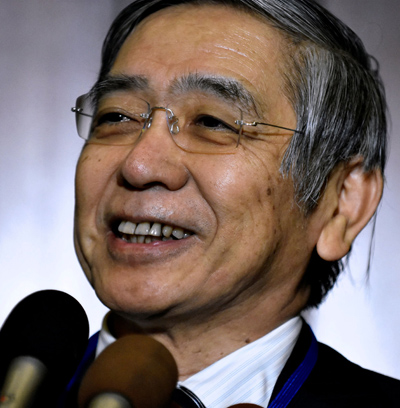Bank of Japan (BOJ) exhausted all its means to combat deflation? Many people think so, but not the central bank’s governor, Haruhiko Kuroda. He is confident that BOJ has more conventional weapons in store to pull the economy out of stagnation due to falling prices. But financial experts believe that the central bank may be endangering itself by bearing too much to maintain price stability.
In September, the BOJ monetary policy board left its policy rate unchanged at minus 0.1 per cent. Kuroda said he could push the interest further down to the negative zone to achieve BOJ's inflation target of 2 per cent.
BOJ continues to spend huge amounts by way of purchasing government bonds and other assets. But owing to deflationary trends, the bonds are losing their value every year. If BOJ continues to invest in government bonds, the central bank would be bankrupt in three or four years, warn experts. Furthermore, BOJ's equity investment could become thrice its capital within a couple of years. A drop-off in the equity market could wipe out the central bank's capital. But Kuroda is not worried as he is convinced that the government will salvage the central bank in the face of a crisis. So his focus is on fixing the country's deflation Problem.
Stagnation problem
Falling price should motivate people to consume more. But why doesn't it actually work in Japan? Well, decreasing price level can help the market potential if the fall is within marginal limits. But when the prices are tumbling down, customers postpone buying expecting them to fall further. Then the market will become unsustainable and it collapses.
 Bank of Japan Governor Haruhiko Kuroda speaks to reporters during the annual meetings of the IMF and World Bank Group in Washington, October 6, 2016. Photo: Reuters
Bank of Japan Governor Haruhiko Kuroda speaks to reporters during the annual meetings of the IMF and World Bank Group in Washington, October 6, 2016. Photo: Reuters
The Japanese mindset is the root cause of this deflationary trend. Japan is failing to create a sustained inflation owing to an attitudinal barrier. The Japanese people are largely interested in saving rather than spending. Even when the benchmark interest rate is below zero, they would rather repay their debts than borrow and invest money.
In a sinking market, companies cannot be wooed by low interest rates alone. Cheap money does not attract companies to invest, but they rather pay off their debts at the earliest as revenue will be on the decline. Liabilities and debts will not come down at a time when prices and income fall. Government's tax revenue too suffers as income slips. And the economy succumbs to a slow death. Thus a prolonged deflation can be devastating for the economy. The International Monetary Fund has warned Japan that unless it pushes up its economy, the stagnation will persist forever.
No comments:
Post a Comment